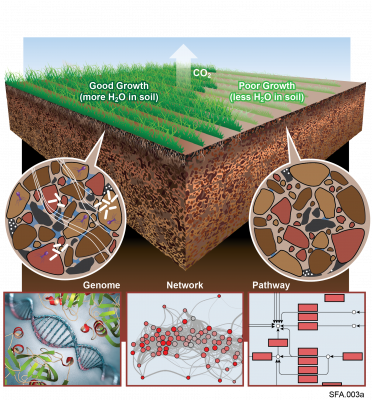Filter results
Content type
Project Type
Publication Type
Tags
- (-) Machine Learning (4)
- (-) Genomics (3)
- Virology (14)
- Viruses (10)
- Health (8)
- Soil Microbiology (8)
- Virus (8)
- Omics (6)
- Omics-LHV Project (6)
- Differential Expression Analysis (5)
- Gene expression profile data (5)
- Immune Response (5)
- Multi-Omics (5)
- PerCon SFA (5)
- Time Sampled Measurement Datasets (5)
- Autoimmunity (4)
- Biomarkers (4)
- Homo sapiens (4)
- Ions (4)
- Mass Spectrometry (4)
- Mass spectrometry data (4)
- Microbiome (4)
- Molecular Profiling (4)
- Nanoparticles (4)
- sequencing (4)
- Synthetic (4)
- Synthetic Biology (4)
- Type 1 Diabetes (4)
- Fungi (3)
- Spectroscopy (3)
Viral communities detected from three large grassland soil metagenomes with historically different precipitation moisture regimes.
Category
To better understand the effects of solution chemistry on particle aggregation in the complex legacy tank wastes at the Hanford (WA) and Savannah River (SC) sites, we have performed a series of tumbler small- and ultra-small-angle neutron scattering experiments on 20 wt % solid slurries of...
The molecular speciation of aluminum (Al3+) in alkaline solutions is fundamental to its precipitation chemistry within a number of industrial applications that include ore refinement and industrial processing of Al wastes. Under these conditions, Al3+ is predominantly Al(OH)4–, while at high [Al3+]...
A major challenge in biotechnology and biomanufacturing is the identification of a set of biomarkers for perturbations and metabolites of interest. Here, we develop a data-driven, transcriptome-wide approach to rank perturbation-inducible genes from time-series RNA sequencing data for the discovery...
The Phenotypic Response of the Soil Microbiome to Environmental Perturbations Project (Soil Microbiome SFA) at Pacific Northwest National Laboratory is a Genomic Sciences Program Science Focus Area (SFA) Project operating under the Environmental Microbiome Science Research Area. The Soil Microbiome...
Datasets
23
The Environmental Determinants of Diabetes in the Young (TEDDY) study is searching for factors influencing the development of type 1 diabetes (T1D) in children. Research has shown that there are certain genes that correlate to higher risk of developing T1D, but not all children with these genes...
Datasets
1
The Diabetes Autoimmunity Study in the Young (DAISY) seeks to find environmental factors that can trigger the development of type 1 diabetes (T1D) in children. DAISY follows children with high-risk of developing T1D based on family history or genetic markers. Genes, diets, infections, and...
Datasets
1
Machine learning is a core technology that is rapidly advancing within type 1 diabetes (T1D) research. Our Human Islet Research Network (HIRN) grant is studying early cellular response initiating β cell stress in T1D through the generation of heterogenous low- and high-throughput molecular...
Datasets
3




